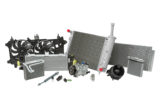It doesn’t matter how professional your business is, or how flawless a system may be, mistakes can still happen. Andy Savva offers some advice on how best to deal with tricky customer complaints.
When running a business, especially a service business like an independent garage, you have to learn to recognise that there are different types of customer, each with different expectations. How we adapt the service provided to the customer, to meet and exceed their expectations, is essential if we are going to succeed in having a healthy and profitable business. This adaptability must be exhibited by everyone in the organisation, regardless of its size.
Andy Savva is a former multiple independent garage owner who boasts over 30 years’ experience in the automotive repair sector. In every issue of PMM he’ll be sharing his advice with workshop owners who want to improve their business’ bottom line, but simply don’t know how to go about it.
However, occasionally we are faced with challenging customers with complaints that are put across in an aggressive or confrontational manner. These customers feel they have a reason to be upset. I used to say to my team at Brunswick Garage that there will always be a small percentage of customers who we will never be able to please – and importantly, we must not let this handful taint our view of all people who come through the door. When dealing with a disgruntled customer, remembering a few simple techniques can help to defuse the situation. If both parties are upset and defensive, the situation will not amount to anything positive.
Through my experience, I came to realise that with virtually every unhappy customer, all that was needed to resolve the concern was to actually listen to them.
Now, it’s okay to dismiss the idea that the customer is always right, but it’s unacceptable to tell them that they’re wrong; sometimes you have to put on a calm face, swallow your pride and act as if they are right. Active listening, eye contact, nodding your head in agreement, being on the same level with them, expressing empathy, and relating to how the customer is feeling can be incredibly helpful.
Remember to place yourself in the customer’s position, as mentioned in my article for PMM in January, and never patronise or look for excuses. We are working in an industry where the customer’s journey is a long one, often involving a number of steps, so we have to accept that sometimes there may be a stumble, however much we try to avoid it.
“Now, it’s okay to dismiss the idea that the customer is always right, but it’s unacceptable to tell them that they’re wrong; sometimes you have to put on a calm face, swallow your pride and act as if they are right.”
Once you have been able to establish some rapport, you may find an agreeable solution to the problem, and you must do whatever you can to achieve this outcome. Explain to the customer exactly what you are going to do to improve the situation. This may include: engaging the customer in a test drive to better understand the complaint, offering the customer a lift back home, or perhaps supplying a loan vehicle while you resolve the issue. You must assure the customer that you are doing everything to the best of your ability to alleviate their concern, whilst causing as little inconvenience as possible.
Many of us have worked in the automotive sector for so long that we forget what it is like to bring our vehicle in for repair, but knowing what your competition is doing can pay dividends. It can help you set yourself apart by creating a business experience and atmosphere that is different from any other garage.
Keeping perspective will help you create a positive customer experience and maintain a solid customer base. At Brunswick Garage, receiving complaints was never pleasant, but we used it as a prompt to better our service and if a customer made the effort to contact us with a concern, we displayed their comments in reception with the thank you letters. We wanted to show our customers that we were not perfect, but also show them that we took complaints very seriously and always aimed to achieve a positive outcome. Learning to handle challenging customers will build respect for your business and ultimately result in higher customer retention and profits.










